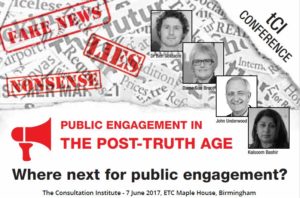News & Insights
Fake News, Anti-Social Media and how to deal with it. Or is consultation doomed?
Two very important aspects of meaningful consultation are that it involves a dialogue and is a genuine process. Unfortunately, what we’ve learned about social media in the last year or so is that it is designed to do almost the opposite to public debates.
We understand more than before that social media algorithms encourage the sharing of fake-news, the distribution of alt-facts and rather than fostering debate between opposing sides they encourage people to join echo-chambers and share stories with people of similar opinions.
It seems social media is designed to undermine rational debate where normally people are obliged to listen to both sides of the argument. Established research tells us that when people are presented with conflicting evidence (stuff that disagrees with their opinion) the more they refuse to listen and become entrenched in their own beliefs. Social media, it seems, acts like a turbo for this inherent cognitive dissonance, making it easy for people to discount facts willy-nilly, find agreeable information and retreat into the safety of their propaganda bubbles. If this is the way the world is heading, consultation, as a mechanism for public debate, is surely doomed!
Well, thankfully it doesn’t have to be this way. But people involved in consultation need to raise their game and alter their modus operandi. They simply can’t afford to leave these echo chambers alone and allow debates to be manipulated by misinformation and fake-news.
One fundamental change is that consultation managers need to also act as online facilitators, whose primary role is to be the custodian of a fair consultation process. This will involve actively correcting misinformation, challenging disinformation and making sure facts are distributed fairly. To do this they will need to inject information into online conversations, where sometimes they may not be very welcome. They won’t be trying to win any arguments but will be making sure that people see different points of view. They will be reaching out to the chunk of people who still have an open mind, or may be being manipulated to believe in untruths and fake-news.
More time will also need to be spent mobilising a network of digital spokespeople. These trusted individuals will be equipped with digital content so that they can engage in online debates and challenge any untruths being propagated across social media – always in the interests of the integrity of the consultation. There is an argument that people can be inoculated against the effects of misinformation when it is exposed with a trusted, official, health warning.
Planning will require more discussion about the range of digital content required to look after the quality of consultation. This planned content will need to be supplemented by proactive ‘home-made’ content, as consultation itself becomes more dynamic. Access to videos, images, infographics etc. and the tools to make them, quickly, will be required, to counter fake-news and disinformation.
Consultation managers must also learn to use paid adverts or boosted content to reach target audiences. These adverts or posts can be used to engage seldom heard voices or to counter balance the power of dishonest consultees who are seeking to disrupt the fairness of the consultation process.
But learning to deal with the propagation of untruths is only part of the answer to saving consultation. If people are going to be open minded, it is more likely to happen in a group interaction so the profession must also get better at online engagement. The days of just chucking up an online survey and asking anyone to respond must come to an end – it is open to too much abuse. Instead, just like in the offline world, it should be supplemented by new participatory online spaces, for example: mini-publics; citizen juries; discussion forums; ideation spaces and; deliberative polls. The time has come to invite people to think beyond their 140 characters and join other people in safe online places for dialogue.
Jonathan Bradley will be talking about fake news, anti-social media and how to handle it at the Consultation Institute’s Conference on 7th June in Birmingham. Other topics that will be discussed include the rise of legal challenges to health consultations, lessons learned from the General Election campaign, consultation success stories, and using lies in public debates. To see the programme and to register, click here.




